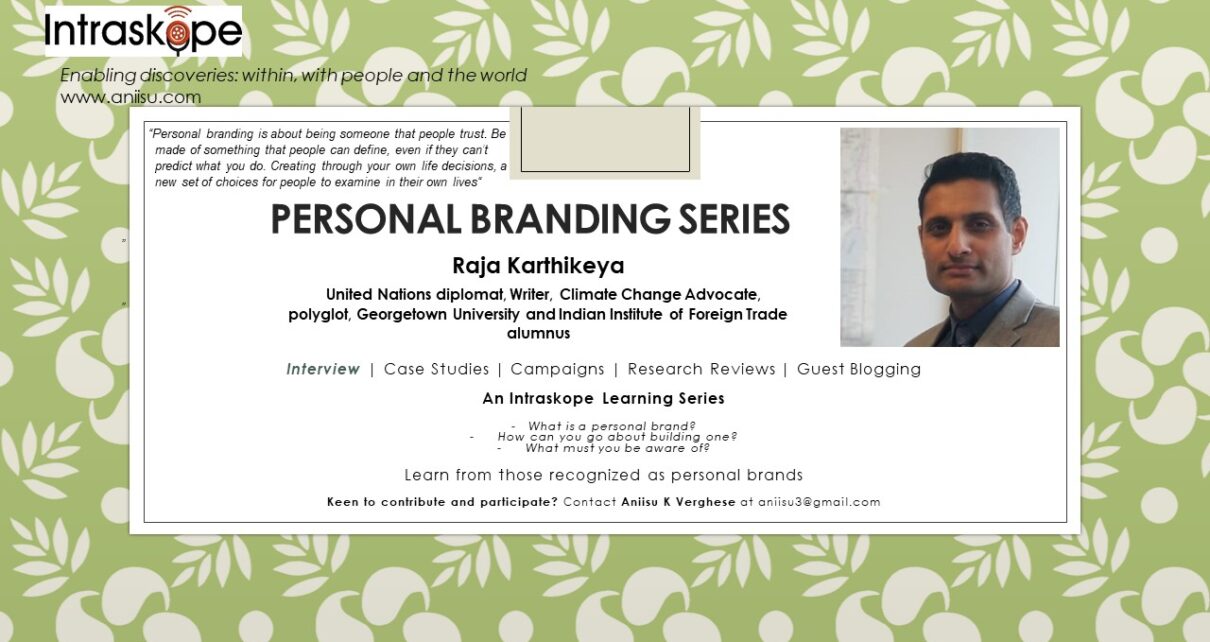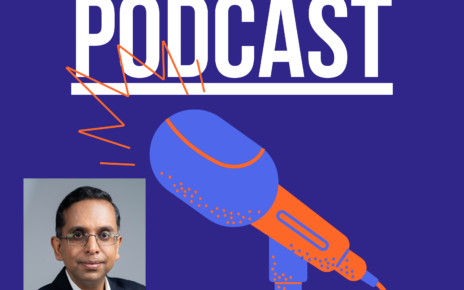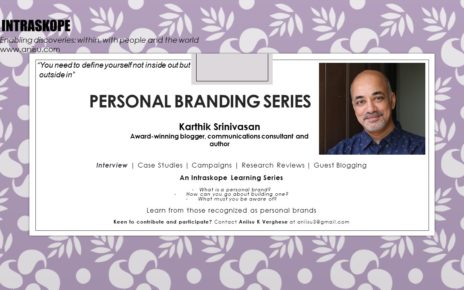Raja Karthikeya currently serves as a Program Manager in the United Nations Secretariat in New York where he works on Middle-East peace issues and is part of UN reform efforts. He has served in UN political missions in Afghanistan and Iraq where his work has included mediation in inter-ethnic and inter-tribal land and water disputes, coalition government formation efforts, and transitional justice mechanisms. In a bid to raise awareness about climate change adaptation in India, in 2017-2018, he crossed the Arctic and Antarctic circles in under a year. In 2005, he was named one of the Indians of the year by a leading newsmagazine for his rescue work in the Andaman and Nicobar islands following the Asian tsunami. As a former colleague (we worked at i-flex solutions in India) and a good friend, he demonstrated what it means to think positively about change and making a difference to the community. I remember vividly his determination to contribute to the tsunami relief and how he braved the conditions to get to ground zero and pitch in. Likewise, when I mooted a road safety campaign to raise awareness in the city of Bengaluru and India, he proactively joined hands to add value and drive change. A brilliant mind, his ability to connect with people, assess situations and connect the dots is outstanding.
In the 28th edition of Intraskope‘s Personal Branding Series, Raja, a UN diplomat, writer and climate advocate highlights the power of action and consistency in building a personal brand. Learn more in this interview.
Watch the YouTube video interview and read the complete interview below. Look up more such stories on my YouTube channel and on LinkedIn.
Interview
1. What according to you is personal branding?
It’s about being someone that people trust. Be made of something that people can define, even if they can’t predict what you do. Creating through your own life decisions, a new set of choices for people to examine in their own lives. Expand the horizon of what is possible.
2. Do you consider yourself a personal brand? If yes, how do you know it?
I’ve never consciously worked to create a brand for myself. I know that a brand is one that one can ignite thought, galvanize people and create impact. My focus has been on achieving a vision of towards bringing people together and building trust. And to do this with empathy. To what end? To break through our prejudices and solve our common challenges – climate change, chronic conflict and concerted denial of opportunity to many among us. But to ensure this vision of togetherness, I pursue what I call “One-ism”. Act without waiting for instructions or institutions. Don’t keep talking in circles and analyzing ad nauseum, act. Act together if possible, but alone if needed. Act responsibly, with an eye not on so much on your imagined reputation but on the consequences of your action. Act because there are consequences of inaction. Act because if you don’t, no one else might. Do everything you can to make a difference. You and I have to do it. The individual can be a more potent actor at times than an institution government will ever be. A few years after Outlook magazine featured me as one of the Indians of the Year 2005 following my rescue and relief work in the Andaman islands after the tsunami, I came across a blog by a young IITian – a software professional talking about my work and wondering why he too couldn’t do what I did. I then understood that many people are looking for a model to emulate and that my actions can have a positive impact without me even knowing it. Once you see this happening, you know that a personal brand is coming into its own.
3. What does one do to go about building a personal brand?
It’s an intuitive process. In my view, one’s goal should be impact, and the brand merely serves an impact amplifier. Act on the things that move you, have a set of consistent values that come across in your writings and interactions, and make sure you communicate what you’re doing – not for the sake of self-publicity but for the sake of moving others to action. And you’ll start becoming a brand over a period of time.
4. What are the attributes of a personal brand? And what do people associate your brand with?
The attributes of your personal brand are best defined by the way you are introduced or described in your absence. From all that I know, I’m associated with taking the path less traveled, taking risks for a greater cause, and a spirit of “eklo chalo” (walking alone) – even if no one comes along, do what you feel is the right thing. I earnestly find happiness in working for the well-being of not my family or kin, but of perfect strangers – people who may never know me or remember me.
5. Based on your observations and learning who according to you is a personal brand? What characteristics do you admire about them?
My learning started at home. My grandfather (a freedom fighter) and father (a journalist) have both been inspirations for me, in that they saw their work not as any paid job but as a duty towards society. Their work in politics and writing, in the face of tremendous hardship, was never for personal gain and was based on a conscious choice to follow their calling. My mother’s social conscience and my sister’s deep sense of empathy have strongly shaped the way I’ve followed my calling. As personal brands, Albert Schweitzer, Gandhi and Mandela have been personal brands that I’ve deeply admired. Their tenacity and consistency are worth emulation.
6. What steps did you take to build your brand? How do you know it is working?
There is an internal and an external preparation. Internally speaking, I took risks. Negotiated my fears. Took advice but followed by conscience. Followed the motto – I shall either find a way or make one. Poetry inspired me and I made sure I read and re-read the right lines at the right time. Externally, I kept my word. Worked in all sincerity and was always the first to volunteer. Did not indulge in sarcasm or try to bring down others in order to rise. Wherever I could, I led. Where I was fortunate to see a leader, I followed diligently and learnt. I did things that were not part of any job description but were based on an inner calling. Honed my beliefs and arguments based on comprehensive study and travel. Realizing that language is the door to learning about other peoples and cultures, I pursued the study of languages. At one point, I could speak 13 languages to some degree of proficiency. I made sure I communicated my beliefs about how to achieve a just society to friends – not to impose but to perhaps trigger thought. Published widely – I write an op-ed on a contemporary issue at least every quarter in addition to other writing, and shared my thoughts – and only those I deemed necessary to share – on social media in a responsible manner.
7. What challenges did you face while building a personal brand? What techniques did you use?
Growing up, I was inspired by great leaders that I read about in my textbooks. I imagined leaders as people who lead soldiers in battles or give speeches from platforms. But I realized in my teens that such leaders are often ‘appointed”. As a college student, on surviving the Bhuj earthquake, rather than return home, I went to the epicenter to assist in rescue operations. It was the right thing to do. I had no doubts about it and even when I was tired, a deep almost spiritual calling told me to continue. When people came up to me to congratulate me and to even ask for guidance on what they could do, I could not understand why. I realized that this was a way to lead, through service. After that, I always followed by conscience. I could never say “this is not my job” or “let somebody else do it Years later, I left a well-paying private sector job to join tsunami rescue operations in the Andaman and Nicobar islands. Some years later, I left the private sector altogether to study international development. But on seeing that manmade disasters like wars take a higher and more far-reaching toll than any natural disaster, worked hard to understand the psychology of conflict and what I can do to build trust between people. It didn’t come in a day and it didn’t happen in the comfort of a desk job. I left a fairly settled life in Washington DC to serve with the UN in a volatile area in Afghanistan and later in Iraq. Sacrificed parts of my personal life for the sake of what I saw as more than a job, but as a mission. Sometimes, I had to seriously negotiate fear inside myself while looking for truth in the proverbial fog of war. Crossing the Arctic and Antarctic circles in one year to raise awareness about climate change took a lot of preparation and was a true test of my own brand . I was truly touched to see how people contributed to this cause. Other than when I was raising funds through crowdfunding, I never reached out to people. My approach has always been to practice a set of beliefs, very transparently. This includes: do the right thing. Do it for the right reasons, and the reasons have to go beyond yourself. Don’t follow what others are doing. Do what they don’t want to do, what they won’t risk doing. Don’t look for recognition. Be obsessed with making a difference – no matter how small. Don’t be attached to any possessions. Do not take satisfaction from what you’ve already done. Those who rest on their past, become history. Look forward to the road that lies ahead. Take pleasure in meeting people and learning from them. Do not be inflexible in taking advice, but never let your integrity – your moral compass – waver. So that whatever people may say about you, they can never question your sincerity. I think this approach of living my beliefs is all I’ve done to build my brand.
8. During the process of building your own brand, what did you gain in the process? What did you lose?
I gained the love of people and very importantly, a deeper understanding of myself. The staples of life that I forewent in the process, I guess they never really moved me in the first place.
9. How can someone starting from scratch build a personal brand? What is the first step he or she must take?
Ask yourself how you like people would to talk about you in your absence. Ask yourself what are your values. Who inspire you and what did they stand for? (My grandfather who, despite being the only son of his parents, joined the freedom struggle and underwent tremendous hardship for the sake of national independence, has been a deep source of inspiration for me). Once these are clear, identify and rank your priorities in life: such as family, fame, wealth, making a difference. Not all of us have the luxury of ranking them the way we want to but life is long and we need to continually rank these priorities as we achieve success. Once your life priority is clear to you, everything you do will be a step towards it. And in the process, your personal brand will come to shape itself.
10. If you had the opportunity to change something about the way you built your personal brand, what would that be?
I’ve always been driven by my goal of making a conscious difference to build a fair and just society. Equality of opportunity is at the core of it. Eliminating prejudice, discrimination and inequality on the basis of religion, caste and gender is at the core of it. Living with an eye on the future of the planet – as my mother would say “when serving yourself, always consider how many are yet to eat” – this is at the core of it. So I wouldn’t change anything in building my brand – except to pursue my goals with vigor sooner in life.
11. What is your recipe for personal branding success?
Keep your word, no matter what it takes. Every so often, do something meaningful but extraordinary – to inspire yourself and others. Do not fade away. Do not give up. Project only what you are. Personal brands are not about getting your 15 minutes of fame. They are about creating role models through life-long activity.
12. Who according to you are personal brands whom others can follow and learn from?
Contemporary: Aamir Khan, Shashi Tharoor, Narendra Modi, Shinzo Abe, Barack Obama, Justin Trudeau, Greta Thunberg, Prashant Bhushan. Past: Albert Schweitzer, Mahatma Gandhi, Gamal Abdel Nasser, Nelson Mandela, Dag Hammarskjold, APJ Abdul Kalam, Albert Einstein, Henry Kissinger, Fidel Castro, Swami Vivekananda…
13. With COVID19 and other crises what steps can personal brands take?
Resilience is at the heart of every strong brand. Crises come and go, but it’s important to not lose your core values. During crises, anyone who cares about their personal brand should practice and project hope. Crises must spur you to innovate and to reach out. Branding or not, looking out for one another is a human duty and we cannot be blind to it. I’m currently working on a book – based on the individuals I’ve met in life – about how decisions made by ordinary individuals in times of adversity can impact their entire society, negatively or positively. In that sense, each of us as individuals has tremendous power. But with it comes great responsibility. I can cite here how you turned from your own moment of adversity – a road traffic accident – to do years of advocacy for safe driving practices.
14. What’s your advice for youngsters (Gen Z and others) who want to consider their personal brands?
Let the brand evolve from your work, and not the other way round. Your personal brand will not flow from how popular you are but from how trusted you are. If you say you’ll do something, do it. Always keep your promises, no matter what it takes. Do and say unto others only what you would want them to say and do unto you. Let there be sunshine between your public image and who you are in private.
Liked this interview? Please do share your feedback and comments.
Keen to get ahead with your personal brand? Here are some resources:
- Take this course – Personal Branding 101: Unlock Your Potential and Stay Ahead
- Take a FREE assessment on personal branding.
- Refer to the 3C model on Personal Branding
- Sign up for a 60-minute personalized chat on personal branding
- Personal branding for corporate communicators
Missed the earlier episodes? Read the interviews with Muqbil Ahmar, Tinu Cherian Abraham, Joseph Fernandez, Christina Daniels,Karthik Srinivasan,Gautam Ghosh, Alexander Michael Gittens, Mubeen Azeez, Itzik Amiel, Mangal D Karnad, Abhijit Bhaduri, Sandeep K Krishnan PhD, Scott Shirai, Sunil Robert, Latha Vijaybaskar PhD, Abha Maryada Banerjee, Dr. Amit Nagpal, Sukanti Ghosh, Amith Prabhu, Dave Carroll, Prof. Deva Rangarajan, Ramesh Thomas, K V Dipu, Chip Helm, Suresh Ramdas, Karthik Nagendra PhD and Jeppe Hansgaardonline and share your thoughts.
Keen to join this Series and share your thoughts on Personal Branding? Write to me at [email protected]
Please subscribe to my YouTube Channel and follow me on Medium.
#resilience #change #determintation #risktaking #oneism #personalbranding #lifeskills #clarity #commitment #consistency #addvalue #buildexpertise #reinventyourself #focus #branding #drive #communications #fulfilment



